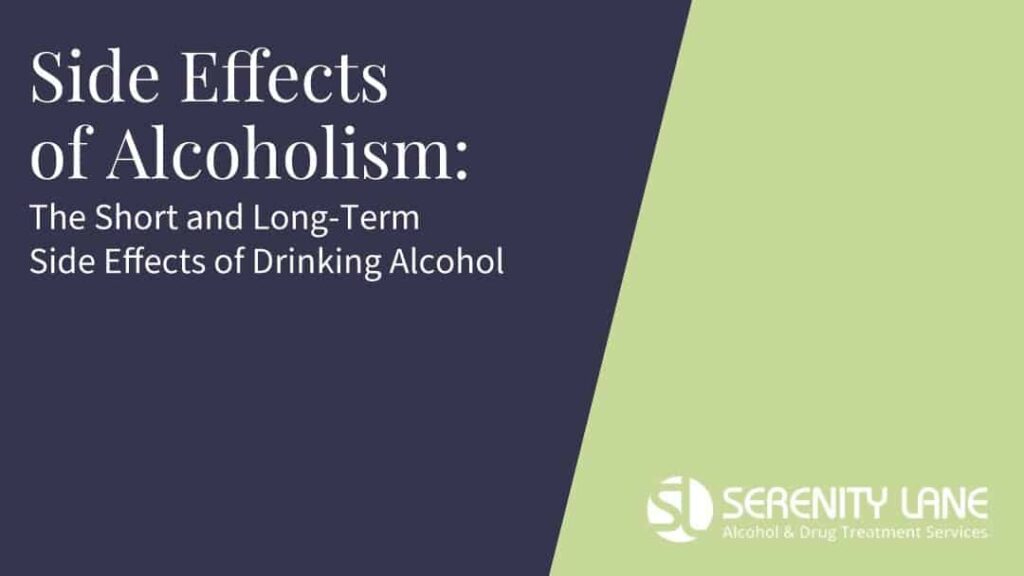Serenity Lane offices have been impacted by the ice storm throughout the state. Click here for the most up-to-date information on the status of our services. (last updated 1/18/2024, 5:42 PM)

Alcohol is the most commonly consumed drug in the United States with nearly 55% of Americans having reportedly drunk alcohol in the last month. In fact, it’s hard to escape the availability of alcohol, especially as a young or middle-aged adult. Sports events, wedding receptions, and various parties are all situations where alcohol is free-flowing and readily available for anyone who wants it.
The danger of drinking to excess is that it can have serious consequences both after one occasion and over time. When a person drinks too much, even just once, there is the potential for them to have impaired judgment leading to driving while drunk or worse. While the vast majority of people will not show such reckless behavior after just one episode of excessive drinking, there is still the potential for developing health consequences over time due to drinking.
Excessive and habitual drinking can cause both short-term and long-term health problems and side effects.
Before we explore these potential health hazards, it’s important that we understand what qualifies as an alcohol use disorder (AUD), the medical term for alcoholism.
Alcohol use disorders can be very difficult to spot as an outsider looking in. Because alcohol is widely available, legal, and even culturally acceptable in many situations, it can be difficult to identify a person who is suffering from AUD.
That said, there are certain behaviors that suggest a person may have AUD.
The Diagnostic and Statistical Manual of Mental Disorders (DSM) states that anyone who meets two of the 11 following criteria within a 12-month period may be diagnosed with an alcohol use disorder. Here are some questions to consider to accurately assess whether you or a loved one may be suffering from a problem with alcohol.
In the past year, have you (or they):
If any of these symptoms are things you or a loved one has experienced, your drinking habits may already be cause for concern. The more symptoms you’ve experienced, the more likely it is you’ve become physically dependent on alcohol. It may be time to seek help from a licensed alcoholism treatment program.
While some of the more advanced damaging effects of alcohol will not be experienced by someone who only drinks to excess every once in a while, there are some short-term effects that can be dangerous.
The liver is the main organ responsible for processing alcohol in the body. Because alcohol volume varies in different beverages, a 1.5-ounce (45-ml) shot of vodka, a 5-ounce (150-ml) glass of wine, and a 12-ounce (355-ml) bottle of beer are about equal in the amount of alcohol they contain. The typical adult liver can only safely process one of these beverages per hour.
When a person consumes more alcohol than their liver can handle, the excess alcohol ends up in the bloodstream. This increases the blood alcohol content or BAC, which eventually ends up affecting the brain. An elevated BAC is what leads to all of alcohol’s desired and undesired short-term effects.
The short-term effects of alcohol intoxication vary from mild to severe and include:
Occasional drinkers are also at risk for alcohol overdose, also known as alcohol poisoning. It only takes one incident of drinking to extreme excess to potentially suffer the effects of alcohol poisoning.
Alcohol poisoning occurs when there is so much alcohol in a person’s bloodstream that areas of the brain responsible for essential functions begin to shut down. These areas of the brain are responsible for basic life-sustaining functions such as breathing, heart rate, and temperature control. Anyone who drinks too much alcohol too quickly is at risk of suffering from alcohol poisoning.
Anyone who engages in binge drinking is especially at risk of overdosing on alcohol and experiencing alcohol poisoning. The Centers for Disease Control and Prevention (CDC) defines binge drinking as a pattern of drinking that brings a person’s BAC to 0.08% or above. This typically happens when men consume five or more drinks or women consume four or more drinks in about two hours.
Learning how to tell if a person has progressed from being drunk to alcohol poisoning can help save the life of a friend or loved one. Luckily, there are specific signs and symptoms that suggest a person is in the early stages of alcohol poisoning.
These symptoms include:
In extreme cases of alcohol poisoning:
When a person habitually drinks alcohol over months or years, it will have negative impacts on various organs and systems of the body. When you drink, alcohol enters the bloodstream through the lining of the stomach and intestines and is then circulated throughout the body. Anything inside your body that alcohol comes into contact with can be damaged over time.
Because of this, people suffering from long-term AUD are at a much higher risk of developing cancer of the liver, mouth, tongue, throat, esophagus, and stomach.
Habitual heavy drinking will eventually damage various organs, including the:
The ways alcohol will affect a person’s body over time depend on a number of different factors, including age, biological sex, amount of alcohol consumed regularly, prescription medications the person may take, and overall physical health.
Let’s explore the ways long-term AUD can affect various organs.
Alcohol interferes with the parts of the brain responsible for memory and communication. Alcohol can produce detectable impairments in memory after only a few drinks, and as the amount of alcohol increases, so does the degree of impairment. Over time, some of these changes can potentially lead to permanent memory issues.
Alcohol may also be a contributing factor to mental health disorders such as anxiety, depression, bipolar disorder, and antisocial personality disorder. When AUD occurs alongside a pre-existing mental health disorder, the two issues are known as “co-occurring” disorders and require a special approach to treatment.
Since the liver is the main organ responsible for filtering alcohol out of the bloodstream, it makes sense that long-term, habitual heavy drinking can lead to serious liver damage. Heavy amounts of alcohol over a long period of time can cause inflammation and scarring of the liver. When the liver suffers scarring, that means it will no longer be able to operate at full capacity,
Some of the potential liver conditions that can develop include fatty liver disease, alcoholic hepatitis, liver fibrosis, and cirrhosis.
When the liver is unable to keep up with the rate of alcohol in the bloodstream, that alcohol-contaminated blood gets pumped through the heart. Over time, this can lead to numerous heart problems.
According to the Centers for Disease Control, heart disease is the leading cause of death for men, women, and people of most racial and ethnic groups in the United States. Long-term, excessive drinking is one of the main causes of heart disease. Alcohol is a contributing factor to cardiomyopathy (a stretching and weakening of the heart), arrhythmias (irregular heartbeats), stroke, and high blood pressure.
The pancreas is an essential organ in the body as it creates hormones that help break down sugar in the bloodstream (insulin and glucagon). Long-term alcohol consumption can cause pancreatitis, which is a potentially fatal inflammation of the pancreas. Also, byproducts of alcohol metabolism within the pancreas may damage cell membranes, leading to further inflammation.
Along with the liver, the kidneys are also responsible for filtering toxins from the blood. Over time, severe AUD can cause the liver to no longer operate as it should. This leaves much of the blood-filtering duties to the kidneys. Overworked kidneys can lead to kidney disease and damage.
Long-term heavy drinking also causes high blood pressure, which can also damage the kidneys.

Even when consumed in moderation, alcohol can negatively affect the digestive system. It causes the stomach to produce more acid than usual, which leads to various conditions such as acid reflux and inflammation of the stomach lining (also called gastritis). Other various digestive issues caused by alcohol include nausea, vomiting, ulcers, internal bleeding, and diarrhea.
As mentioned before, any parts of the body that come in direct contact with alcohol are at an increased risk of cancer over time. Since alcohol sits in the stomach for a period of time before being digested or absorbed into the bloodstream, people with long-term AUD are at a much increased risk for stomach cancer.
Here at Serenity Lane, we provide a cutting-edge, medically supported withdrawal program, also known as alcohol detoxification, at our inpatient treatment facility in Coburg, Oregon. The first step in your recovery from alcohol use disorder is detox.
Our team of medical professionals uses a standardized process that’s designed to be the most effective way to help someone achieve long-term recovery from dependence on alcohol. They are prepared and qualified to handle all aspects of detox, including withdrawal symptoms and mental health issues that may occur.
In order to be sure safety is the top priority of medical detox, Serenity Lane focuses on the benefits of having qualified, compassionate professionals who can handle the withdrawal process with ease. The discomfort and pain that can be associated with alcohol and drug withdrawal can make it crucial those going through detox get care that addresses both their emotional and medical needs.
In addition to reducing the physical risks of quitting alcohol on your own, this focus on treating the whole person is why a medical detox program is so important.
At Serenity Lane, our processes are developed with the goal of giving you the best chance of turning alcohol addiction into lasting recovery.
Serenity Lane offers individualized, effective, and innovative solutions for our clients, neighbors, colleagues, friends, acquaintances, and family members struggling with alcohol dependency and any other addiction. Our residential treatment center in Coburg, Oregon, can help you or a loved one today.
Don’t wait another day to get the help you or a loved one needs. Call to speak to a recovery specialist now: (800) 543-9905
What happens when you drink alcohol every day?
When a person drinks alcohol every day, the brain and body begin to adjust and develop a tolerance. This means the person will need to drink more alcohol to achieve the same level of intoxication. This is the basis for physical addiction to alcohol and can quickly lead to alcohol use disorder (AUD).
What are five long-term effects of alcohol use?
There are numerous negative effects of long-term drinking. Long-term alcohol use disorder can cause heart disease, damage to the liver, stomach cancer, memory loss, and inflammation of the pancreas.
What are the symptoms of drinking too much alcohol?
Some of the side-effects of drinking too much alcohol include lowered inhibitions (self-restraint), difficulty concentrating, loss of coordination or motor control, blurred vision, impaired critical thinking and judgment, mood swings, reduced core body temperature, raised blood pressure, passing out, and vomiting.